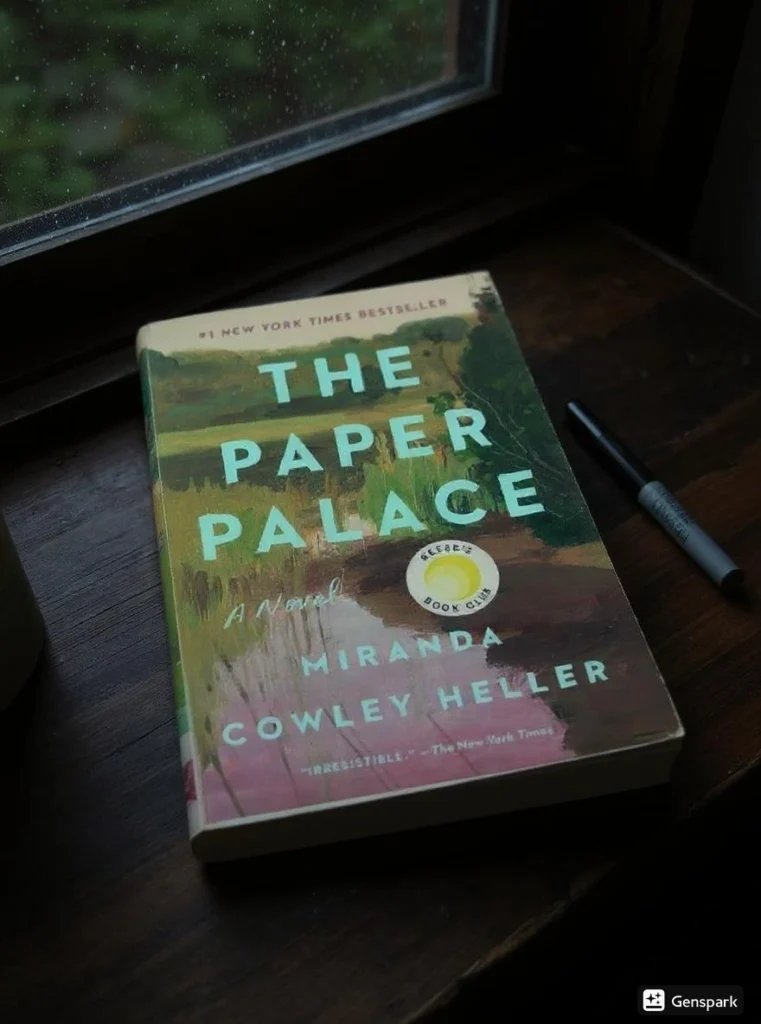I stumbled upon The Paper Palace during a rainy weekend in Boston, and something about the Cape Cod setting immediately drew me in. This Reese’s Book Club pick became an instant #1 New York Times bestseller with over 2 million copies sold worldwide, but I had to see for myself if it lived up to the hype. As someone who’s spent countless summers on the East Coast, I was curious about Heller’s portrayal of privileged summer life and family secrets.
The book centers on Elle Bishop, a fifty-year-old woman who faces an impossible choice between her stable marriage and a lifelong passion. What makes this story compelling isn’t just the love triangle, but how Heller weaves together decades of family trauma, class dynamics, and the weight of one pivotal decision. I found myself completely absorbed by the dual timeline structure that bounces between one crucial day and fifty years of memories.
Tender yet devastating, The Paper Palace considers the tensions between desire and dignity, the legacies of abuse, and the crimes and misdemeanors of families. After finishing it at 2 AM, I was left questioning everything about loyalty, love, and the choices that define us. This isn’t your typical beach read – it’s a raw examination of how childhood trauma shapes adult relationships and the price we pay for family loyalty.
Key Takeaways
Family trauma creates invisible chains that bind us across generations, affecting our ability to form healthy relationships and make clear-headed choices.
The line between passion and destruction often blurs when we’re forced to confront the roads not taken and the prices we’ve paid for security.
Memory serves as both blessing and curse, with our recollections of the past coloring every present moment and future possibility.
The weight of one decision can redefine an entire lifetime, but sometimes the biggest choice is whether to remain trapped by our past or finally break free.
Basic Book Details:
Publishing Information: July 6, 2021 by Riverhead Books
Genre: Literary Fiction, Contemporary Fiction
Plot: A woman must choose between her husband and childhood love after a passionate encounter at her family’s Cape Cod retreat
Series information: Standalone novel
Page count: 400 pages
Main Characters:
Elle Bishop: A 50-year-old mother torn between security and passion
Peter Bishop: Elle’s steadfast English husband who represents stability
Jonas: Elle’s childhood friend and lifelong obsession
I’ve been reading literary fiction for over two decades, and rarely does a debut novel grab me by the throat like The Paper Palace did. Miranda Cowley Heller, former HBO executive behind The Sopranos and Six Feet Under, brings her storytelling expertise to this emotionally charged debut that left me emotionally drained yet strangely satisfied.
The book opens with Elle swimming in the pond at dawn, reliving her passionate encounter with Jonas the night before. What could have been a simple affair story transforms into something far more complex as Heller peels back layers of family dysfunction, generational trauma, and the suffocating weight of WASP privilege.
Plot Summary And Narrative Structure
Dual Timeline Framework – Twenty Four Hours And Fifty Years Of Memory
Heller structures the novel around a single day – the morning after Elle’s encounter with Jonas – while weaving in decades of backstory through Elle’s memories. This isn’t just a clever literary device; it mirrors how we actually process major life decisions. I found myself completely immersed in this technique, which felt natural rather than gimmicky.
The present-day narrative takes place over roughly 24 hours, from Elle’s morning swim to her ultimate decision. But the real story unfolds through flashbacks spanning fifty years, from Elle’s childhood summers at the Paper Palace to her mother’s various marriages and the family’s darkest secrets.
The Central Moral Dilemma – Elle’s Choice Between Security And Passion
At its core, this is a story about an impossible choice. Elle must decide whether to leave her devoted husband Peter and their three children for Jonas, the man who’s haunted her thoughts for decades. But Heller makes this choice anything but simple. Peter represents safety, stability, and genuine love. Jonas represents passion, history, and the life Elle might have lived.
What makes this dilemma so compelling is that there’s no clear right answer. Both men love Elle deeply, but in completely different ways. The moral complexity kept me turning pages late into the night, desperate to see what Elle would choose.
Character Analysis And Development
Elle Bishop’s Complex Psychology – From Privileged Wife To Torn Protagonist
Elle is simultaneously sympathetic and frustrating. She’s a woman who’s lived her entire life making safe choices, marrying Peter because he represented stability after a chaotic childhood. But she’s also selfish, willing to risk everything for a passion that might be more memory than reality.
Elle herself is a flawed, sometimes rude but predominantly good person who has made some bad choices but made many more good ones. This complexity makes her feel real rather than archetypal. I found myself both rooting for her and wanting to shake her throughout the novel.
Her psychology is shaped by childhood trauma, including sexual abuse and her mother’s neglect. These experiences created a woman who craves both security and danger, often simultaneously.
The Men In Elle’s Life – Peter’s Steadfast Love Versus Jonas’s Magnetic Pull
Peter Bishop emerges as perhaps the most sympathetic character in the novel. There’s a wealth of character in Peter’s dedication to socks-and-sandals, the “Englishman’s uniform abroad”. He’s devoted, reliable, and genuinely loves Elle despite her flaws. His English reserve and quiet strength make him an easy man to love, but perhaps not an exciting one.
Jonas represents everything Peter isn’t – dangerous, unpredictable, and deeply connected to Elle’s past. He’s the embodiment of the road not taken, the life Elle gave up for security. Their connection feels both inevitable and destructive.
Literary Techniques And Writing Style
Symbolism And Metaphors – Water, Hummingbirds, And The Paper Palace Itself
Heller employs water as a recurring symbol throughout the novel. The pond where Elle swims becomes a place of reflection, cleansing, and decision-making. Water represents both life and death, passion and peace. The morning swim that opens the novel sets the tone for Elle’s internal journey.
The Paper Palace itself serves as a metaphor for the fragility of the life Elle has built. Like paper, it’s beautiful but easily torn. The family’s summer retreat holds decades of secrets and memories, both wonderful and terrible.
Hummingbirds appear throughout the novel as symbols of fleeting beauty and the delicate balance between life and death. Their brief, intense lives mirror Elle’s passionate encounter with Jonas.
Narrative Voice And Point Of View – First Person Intimacy And Unreliable Memory
Heller writes in third person limited, staying close to Elle’s perspective throughout. This intimacy allows readers to understand Elle’s internal struggle while maintaining some objective distance. The narrative voice feels authentic and immediate.
Memory plays a crucial role in the storytelling. Elle’s recollections are colored by emotion and time, making her an unreliable narrator of her own past. This technique reflects how we all reconstruct our histories to fit our present needs.
Themes And Social Commentary
Generational Trauma And Family Dysfunction – Breaking Cycles Of Abuse And Neglect
The novel explores how trauma passes from generation to generation like a virus. Elle’s mother, damaged by her own childhood, fails to protect Elle from abuse. Elle, in turn, struggles to be the mother her children need. The cycle of dysfunction seems almost inevitable until Elle faces her moment of choice.
Heller doesn’t offer easy answers about breaking these cycles. Instead, she shows how difficult it is to overcome the patterns established in childhood, even when we recognize their destructive nature.

Class Privilege And Cape Cod Society – WASP Culture And Summer House Dynamics
The novel provides a sharp critique of upper-class WASP culture. The families in the book are wealthy enough to maintain summer homes for decades, but their privilege can’t protect them from internal decay. The beautiful setting masks ugly truths about abuse, alcoholism, and emotional neglect.
The Paper Palace was shortlisted for the Women’s Prize 2022, recognition that speaks to its literary merit and social relevance. Heller exposes the dark underbelly of privileged summer communities where appearance matters more than truth.
| Character | Represents | Key Trait | Relationship to Elle |
|---|---|---|---|
| Elle Bishop | Torn protagonist | Conflicted | Self |
| Peter Bishop | Security/stability | Devoted | Husband |
| Jonas | Passion/past | Magnetic | Childhood love |
| Elle’s Mother | Generational trauma | Neglectful | Parent |
Pros
The dual timeline structure works brilliantly, creating natural tension between past and present. Heller manages to reveal information at exactly the right pace, keeping readers engaged without frustrating them. I never felt lost in the chronology despite the complex structure.
The Cape Cod setting comes alive on the page. The Paper Palace is a completely immersive novel- you can see the beautiful landscape, feel the coolness of the water and taste the leisurely breakfasts and dinners that the families have. Heller’s descriptive prose transport you directly to the Back Woods of Cape Cod.
Character development is exceptionally strong. Even minor characters feel fully realized, from Peter’s pompous parents to Elle’s various stepfathers. Each person serves a purpose in Elle’s journey toward self-understanding.
The moral complexity elevates this above typical romance novels. There are no clear villains or heroes, just flawed people making difficult choices. This ambiguity makes the story feel authentic and mature.
| Reading Experience | Rating | Notes |
|---|---|---|
| Emotional Impact | High | Left me questioning relationships |
| Pacing | Excellent | Perfect balance of past/present |
| Character Development | Strong | Complex, flawed protagonists |
| Setting | Immersive | Cape Cod comes alive |
Cons
The privileged setting may alienate some readers. It’s hard to fully sympathize with characters whose biggest problems stem from having too many options rather than too few. The wealth and leisure of Elle’s world can feel disconnected from most readers’ experiences.
Some flashbacks feel unnecessarily lengthy. While the childhood trauma is important to Elle’s character, certain scenes could have been trimmed without losing impact. The pacing occasionally suffers from too much backstory.
The ending, while bold, may frustrate readers looking for clear resolution. Heller leaves Elle’s final choice somewhat ambiguous, which fits the novel’s themes but might disappoint those wanting definitive answers.
Elle’s passivity can be maddening. For much of the novel, she’s acted upon rather than acting. While this reflects her character’s development, it sometimes makes for frustrating reading when you want her to take control of her life.
| Challenge | Impact | Personal Response |
|---|---|---|
| Privileged characters | Some disconnect | Acknowledged but didn’t detract |
| Lengthy flashbacks | Pacing issues | Occasionally lost momentum |
| Ambiguous ending | Reader frustration | Appreciated the complexity |
Reading this novel at my cabin in New Hampshire, I was struck by how place shapes identity. The Paper Palace isn’t just a setting; it’s a repository of memory and meaning. Like Elle, I found myself reflecting on the choices that define us and the prices we pay for security versus passion.
After twenty years of reviewing fiction, I can confidently say this debut stands out. Heller brings her television writing experience to bear, creating scenes that feel cinematic in their intensity. The novel works on multiple levels – as a love story, a family saga, and a meditation on choice and consequence.
The book reminded me why I fell in love with literary fiction in the first place. It’s the kind of novel that stays with you long after the final page, making you question your own choices and relationships. I found myself discussing Elle’s dilemma with friends weeks after finishing.
Final Verdict
The Paper Palace succeeds as both an entertaining read and a serious work of literary fiction. Heller has crafted a debut that announces her as a major new voice in contemporary literature. While the privileged setting and sometimes passive protagonist may limit its appeal, the novel’s emotional honesty and moral complexity make it worth reading.
This isn’t a book for readers seeking easy answers or clear-cut heroes. It’s for those who appreciate nuanced character studies and aren’t afraid to sit with uncomfortable truths about family, loyalty, and desire. The ambiguous ending will spark book club discussions for years to come.
I recommend this for readers of authors like Tana French and Donna Tartt, who appreciate psychological depth and beautiful prose. It’s also perfect for anyone interested in generational trauma in literature or Cape Cod culture.
Dionysus Reviews Rating: 6/10
Sip The Unknown—Discover Stories You Never Knew You’d Love!
Dionysus Reviews Has A Book For Every Mood
Biography & Memoir
Fiction
Mystery & Detective
Nonfiction
Philosophy
Psychology
Romance
Science Fiction & Fantasy
Teens & Young Adult
Thriller & Suspense
Frequently Asked Questions
What are the main themes explored in The Paper Palace?
The novel explores generational trauma, the tension between security and passion, class privilege, and the weight of family secrets. Heller examines how childhood experiences shape adult relationships and the difficulty of breaking destructive family patterns. The Cape Cod setting serves as a lens for exploring WASP culture and the gap between appearance and reality in privileged communities.
How does the dual timeline structure affect the reading experience?
The dual timeline creates natural tension between Elle’s present crisis and her past experiences. Rather than feeling gimmicky, it mirrors how we actually process major decisions – bouncing between immediate circumstances and formative memories. This structure allows Heller to reveal information strategically while maintaining suspense about Elle’s ultimate choice.
Is Elle Bishop a sympathetic protagonist despite her flaws?
Elle’s complexity makes her simultaneously sympathetic and frustrating. Her childhood trauma explains her need for both security and danger, but her willingness to risk her family for passion can be maddening. She’s neither hero nor villain, but a realistic portrayal of someone shaped by forces beyond her control yet responsible for her own choices.
How does the Cape Cod setting function in the story?
The Cape Cod setting operates almost as a character itself. The Paper Palace represents both sanctuary and prison for Elle’s family, holding decades of secrets and memories. The natural beauty of the landscape contrasts with the ugliness of family dysfunction, while the exclusive summer community exposes the dark underbelly of privilege and tradition.
What makes this debut novel stand out in contemporary fiction?
Heller’s television writing background brings cinematic intensity to key scenes, while her understanding of character development creates authentically flawed protagonists. The moral complexity elevates the story above typical romance novels, and the exploration of generational trauma feels both timely and timeless. The ambiguous ending respects readers’ intelligence while staying true to the story’s themes.









